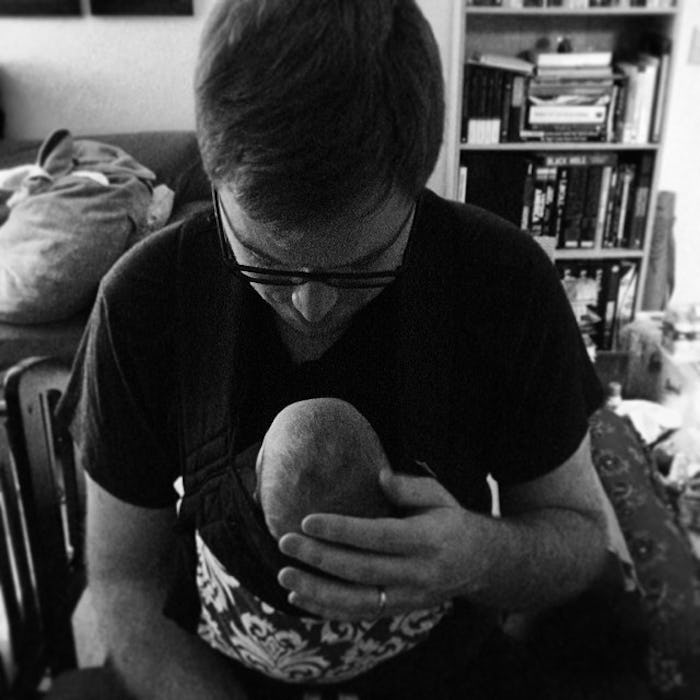Life

7 Baby Wearing Dangers To Take Note Of
Finding practical ways to travel long distances with a child has been a necessity since mammals came into existence. Some animals have it easy, with long arms, pouches on their bellies, or even giving birth to babies who are able to walk almost immediately. For humans, however, it can be a bit more difficult to carry their young around with them. But as long as there have been methods of travel, there have also been common dangers of baby wearing associated with them. Thankfully, there are plenty of ways to avoid these risks and it only takes a few moments to learn something possibly life-saving.
Whether you're a self-proclaimed crunchy mama who embraces a more earthy lifestyle or you're preparing to become a parent, it never hurts to learn more about healthy habits for both you and your little one. If there's one thing I've found through parenting, it's that there is always something new to discover. As soon as you think you've got everything figured out, you'll find that feeling doesn't usually last for long. So if you currently practice or are considering baby wearing, then check out some of these common dangers that are associated with it to be as prepared and safe as possible.
1You Don't Provide Support
You might think that because your baby is already in a type of sling that they're being properly carried. Yet, according to Baby Wearing International, an informational non-profit organization, "it is important your carrier provide adequate support for your infant’s developing neck and back." Not focusing on their entire body being securely held could be a major risk for their health.
2You Don't Readjust
If you breastfeed your infant, you might do so while your child is in their carrier. The Australian Competition & Consumer Commission's safety guidelines, as reported by Kid Spot, warned that you should reposition your baby after breastfeeding to ensure their airway is clear. In general, it's a good idea to burp or readjust your baby to get rid of any gas that could cause difficulty with their breathing or digestion.
3You Keep It Loose
In addition to their general well-being, you probably have your child's comfort in mind as well when wearing them. But what you might consider to be comfortable could actually be quite dangerous. According to the United Kingdom's National Childbirth Trust (NCT), you should wear your baby snugly because a loose baby carrier, "can hinder their breathing and pull on your back," since it would allow them to slump down inside. It's especially important to be aware of this because wraps can become lax over time.
4You Block Baby's Face
It may be tempting to provide your little one with a womb-like environment as you wear them, but bundling them in such a way that you can't see their face is a huge danger. The United States' Consumer Product Safety Commission (CPSC) noted, "make sure you can see your baby’s face or eyes in the sling and that your baby can see you." Placing them so that their head is visible is the best way to avoid suffocation and improper positioning.
5You Ignore Hip Health
Remember when the internet lost its collective mind over Ryan Reynolds wearing a baby carrier? It's not just because he's a sexy dad. Many were freaking out because of the way the baby's feet and legs were. As the International Hip Dysplasia Institute noted that dislocation or improper formation of an infant's hips can occur unless parents wear the baby with their legs in a frog-like position. Basically, you don't want your child's legs to be hanging straight down. Their legs should be outwards with their knees pulled up, almost like a Sumo wrestler stance.
6You Disregard Premature Precautions
If you baby was born prematurely or with an especially low birth weight, there can be extra risks involved with baby wearing. Boba, a well-known maker of carriers, noted in its safety guidelines that low birth weight or premature babies, "should always be carried in an upright position —never in a horizontal 'cradle,' or 'hammock' position." Their smaller size translates to a higher likelihood they could slump down and experience acid reflux or breathing problems.
7You Engage In Routine Chores
It can be easy to almost forget that you're even wearing your baby after a while. In fact, for many of my friends, the practice simply became second nature. The risk here is that, as BWI noted, typically mundane activities, like being around sharp objects or cooking over heat, is extremely dangerous while wearing a baby. So make sure you consider how certain chores could affect your baby.